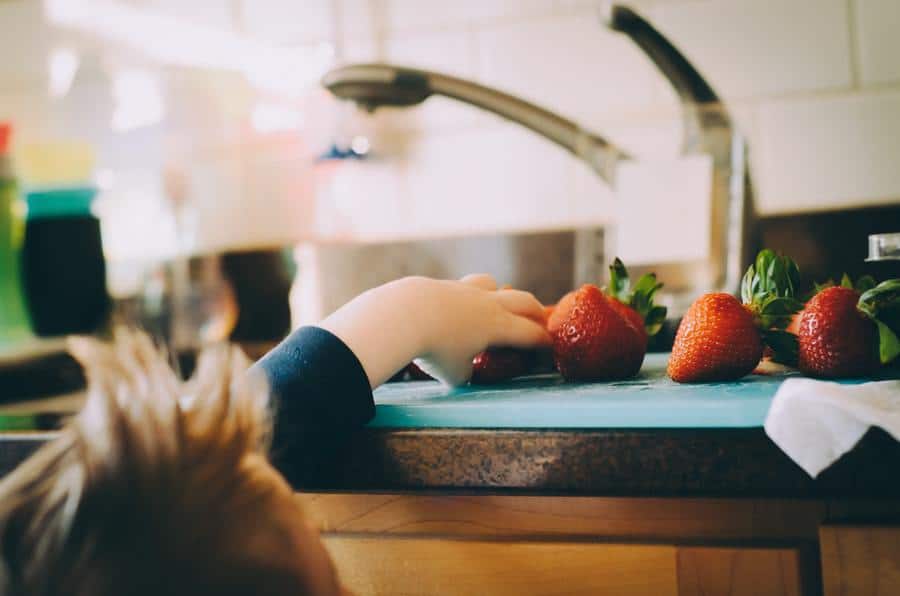Road trip season is upon us and while we understand why you’re considering faking a flat tire to avoid the imminent whining from the back seat— we challenge you to put aside your fears and create lifelong memories along the ribbons of roads that cross North America. CTV Morning Live invited me on set to chat about these trip tips, and—while organizing for the segment—the nostalgia swept over me and I wanted to share some of my personal family road trip tips with you.
As I mentioned in our Kitchen Tips article, I was part of a paper towel scientific experiment. I used a brand new dishcloth in my kitchen over three days and sent it to a lab for testing. I will never use a dishcloth again. I can hardly even bear to keep the results email in my inbox. Typically hard on myself as a Mom and woman, the results make me feel like quite the ogre.
As Moms, we desperately try to keep the kitchen clean. It’s almost as if we feel like a bad mommy otherwise. The kids can be dirty, laundry unfolded and homework not done (who me?) but as long as the counters are clean we’re good, right? Bad news. When it comes to cleaning the kitchen, the majority of Canadians (60 per cent) use a dishcloth, which can harbour and redeposit millions of germs on surfaces and puts families at risk of cross-contamination*.
I’ve just done a dishcloth vs. Bounty DuraTowel challenge and was thrilled with the research that the paper towel that is clinically proven to leave surfaces three times cleaner than a germy dishcloth**. If you are wiping your countertops with a used dishcloth or sponge, you could be spreading around germs in the home. I’ll get my dishcloth test results soon and will add the scientific findings as soon as they’re in! But we also have 6 tips for a germ-free kitchen that you’ll want to take a peek at.
Dr. Elizabeth Scott, Co-director, Simmons Center for Hygiene and Health in Home and Community, recommends the following tips for a happy and healthy kitchen and home:
1. Wash your hands – Prior to any meal preparation, wash your hands often with warm, soapy water and dry them using Bounty DuraTowel
2. Wash and sanitize surfaces and utensils – Reduce the risk of contamination in the kitchen by washing and sanitizing all countertops, cutting boards and utensils that come into contact with food. Do this before and after preparing food and use Bounty DuraTowel to help clean up larger messes and wipe down surfaces
3. Separate your food – Make sure to always separate your raw foods, such as meat and eggs, from cooked foods and vegetables to avoid cross-contamination which is one of the leading causes of food borne illness**. Use separate cutting boards for meats and for vegetables etc.
4. Wash produce thoroughly – Immediately before prepping, wash all whole fruits and vegetables and dry using Bounty DuraTowel. This reduces the risk of transferring pathogens from the rind or skin to the inside of the fruit or vegetable when it is cut***
5. Keep your fridge clean – One way to reduce the risk of cross-contamination is to keep the fridge clean and to keep foods covered since many bacteria and molds are able to grow at refrigerator temperatures. Clean your fridge using a kitchen sanitizer and Bounty DuraTowel
6. Wash reusable grocery bags – Wash and thoroughly dry your reusable grocery bags frequently, especially if you are carrying raw meat, fish, poultry, seafood or vegetables.
*Findings from Proctor and Gamble Bounty Survey 2013, a national sample of Canadian consumers were randomly selected from TNS Canada’s Internet research panel from March 7 to March 11, 2013
**1tsp. spaghetti sauce, 10 mls. coffee, 1/8 tsp creamer on laminate countertop
***The Simmons Center for Hygiene and Health
I am a P&Gmom. The views, opinions and photographs expressed on this blog and in my social networks are my own.


